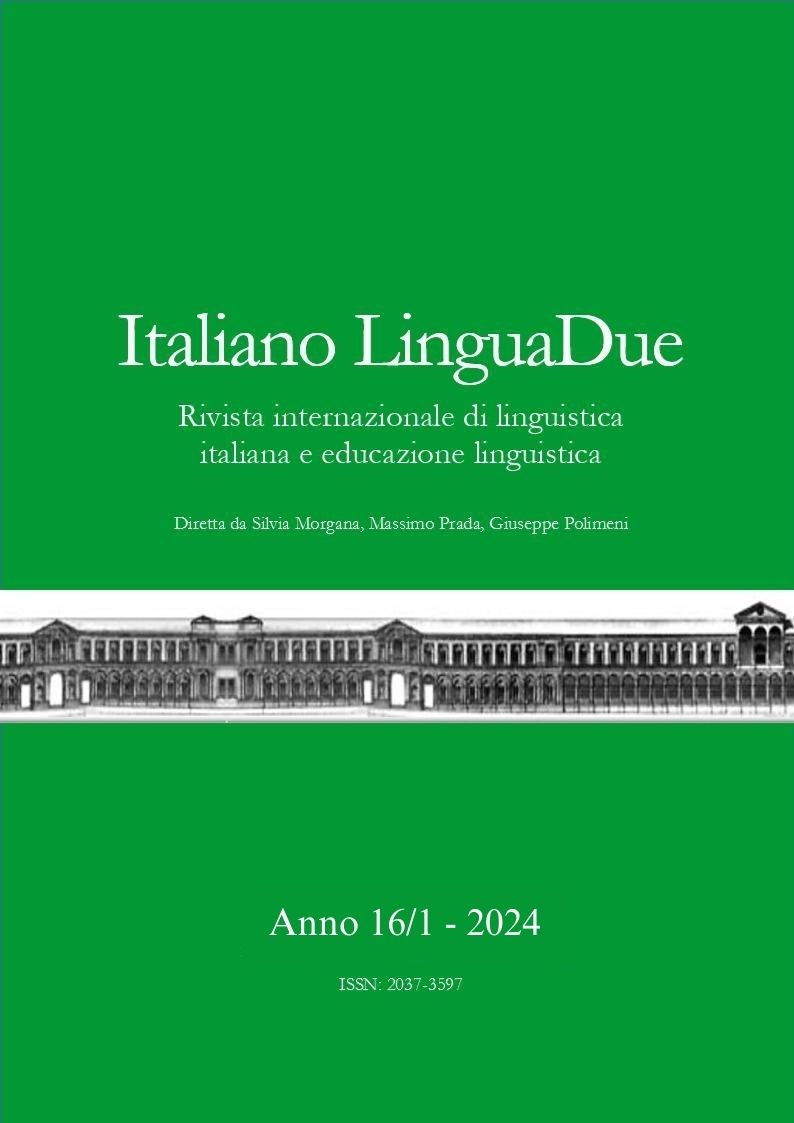MEASURING PARENTS’ MOTIVATION TO PLURILINGUALISM: DEVELOPMENT AND VALIDATION OF A MODULAR INVENTORY
DOI:
https://doi.org/10.54103/2037-3597/23862Abstract
The article aims to support the burgeoning interest in plurilingualism in research and educational practice by introducing a modular inventory for the assessment of parents’ motivation towards plurilingualism. Drawing on Bronfenbrenner’s ecological systems theory (1977), we developed the Parent’s Motivation to Plurilingualism (PMP) inventory consisting of two modules: Module 1 assessing and the three tenets of plurilingualism orientation, employment reasons, culture transmission and socialization, Module 2 assessing general parents’ motivation to plurilingualism. Both modules can be used jointly or separately by researchers, educators and institutions to provide language programmes which respond to families’ expectations and yearnings. In the article, we report the development and the initial exploration of the PMP structure tested via a pilot study (N = 94 parents). Then, we report the results of a further study for the final validation of the PMP on large sample of 227 parents which provide evidence of the consistency and reliability of the PMP. Confirmatory factor analysis supported the factorial structure of the PMP inventory. The study provides insights into the effectiveness of plurilingual education in reflecting family expectations during a wide span of children’ school life and offers a greater understanding of parents’ motivation on the educational success of plurilingual children.
Misurare la motivazione dei genitori al plurilinguismo: sviluppo e validazione di un inventario modulare
L’articolo si propone di sostenere il crescente interesse per il plurilinguismo nella ricerca e nella pratica educativa introducendo un inventario modulare per la valutazione della motivazione dei genitori verso il plurilinguismo. Basandoci sulla teoria dei sistemi ecologici di Bronfenbrenner (1977), abbiamo sviluppato l’inventario Parents Motivation to Plurilingualism (PMP) composto da due moduli: il Modulo 1, che valuta i tre principi dell’orientamento al plurilinguismo, le ragioni di lavoro, la trasmissione culturale e la socializzazione, e il Modulo 2, che valuta la motivazione generale dei genitori al plurilinguismo. Entrambi i moduli possono essere utilizzati congiuntamente o separatamente da ricercatori, educatori e istituzioni per fornire programmi linguistici che rispondano alle aspettative e ai desideri delle famiglie. Nell’articolo riportiamo lo sviluppo e l’esplorazione iniziale della struttura del PMP, testata attraverso uno studio pilota (N = 94 genitori). In seguito, riportiamo i risultati di un ulteriore studio per la validazione finale del PMP su un ampio campione di 227 genitori, che fornisce la prova della coerenza e dell’affidabilità del PMP. L’analisi di conferma ha supportato la struttura fattoriale dell’inventario PMP. Lo studio fornisce approfondimenti sull’efficacia dell’educazione plurilingue nel riflettere le aspettative della famiglia durante un ampio arco di vita scolastica dei bambini e offre una maggiore comprensione della motivazione dei genitori sul successo scolastico dei bambini plurilingue.
References
Antony-Newman M. (2022), “The role of plurilingual parenting in parental engagement of immigrant families”, in Journal of Multilingual and Multicultural Development: http://doi.org/10.1080/01434632.2022.2097686.
Berry J. W. (2006), “Acculturation: A Conceptual Overview”, in Bornstein M. H., Cote L. R (eds.), Acculturation and parent-child relationships: Measurement and development, Lawrence Erlbaum Associates Publishers, Mahwah (New Jersey), pp. 13-30.
Bronfenbrenner U. (1977), “Toward an experimental ecology of human development”, in American Psychologist, 32: https://doi.org/10.1037/0003-066X.32.7.513.
Budría S., Colino A. Martínez de Ibarreta C. (2019), “The impact of host language proficiency on employment outcomes among immigrants in Spain”, in Empirica, 46, pp. 625-652.
Darling N. (2007), “Ecological Systems Theory: The Person in the Center of the Circles”, in Research in Human Development, 4, 3-4, pp. 203-217:
https://doi.org/10.1080/15427600701663023.
De Houwer A. (2007), “Parental language input patterns and children’s bilingual use”, in Applied Psycholinguistics, 28, 3, pp. 411-424:
DOI: https://doi.org/10.1017/S0142716407070221.
Duff P. (2010), “Language socialization”, in McKay S., Hornberger N.H. (eds.), Sociolinguistics and language education, Multilingual Matters, Bristol, UK, pp. 427-455.
Gazzola M., Mazzacani D. (2019), “Foreign language skills and employment status of European natives: evidence from Germany, Italy and Spain”, in Empirica, 46, pp. 713-740: https://doi.org/10.1007/s10663-019-09460-7.
Grin F. (1994), “The Economics of Language: Match or Mismatch?”, in International Political Science Review, 15, 1, pp. 25-42:
https://doi.org/10.1177/0192512194015001.
Hayden M. (2011), “Transnational spaces of education: the growth of the international school sector”, in Globalisation, Societies and Education, 9, 2, pp. 211-224:
http://doi.org/10.1080/14767724.2011.577203.
Hyun-Sook K. (2015), “Korean Families in America: Their Family Language Policies and Home-Language Maintenance”, in Bilingual Research Journal, 38, 3, pp. 275-291: https://doi.org/10.1080/15235882.2015.1092002.
Hu L. T., Bentler P. M. (1999), “Cutoff criteria for fit indexes in covariance structure analysis: Conventional criteria versus new alternatives”, in Structural equation modeling: a multidisciplinary journal, 6,1, pp. 1-55.
Juan-Garau M. (2014), “Heritage language use and maintenance in multilingual communities”, in Applied Linguistics Review, 5, 2, pp. 425-440:
https://doi.org/10.1515/applirev-2014-0019.
Nunnally Jum C. (1967), Psychometric Theory, 1 st ed., McGraw-Hill, New York.
Paugh A. L. (2005), “Acting adult: Language socialization, shift, and ideologies in Dominica, West Indies”, in Cohen J., McAlister K.T., Rolstad K., MacSwan J. (eds.), Proceedings of the 4th International Symposium on Bilingualism, Cascadilla Press, Somerville, MA, pp. 1807-1820.
Redfield R., Linton R., Herskovits M. J. (1936), “Memorandum for the Study of Acculturation”, in American Anthropologist, 38, 1, pp. 149-152.
Tabachnick B. G., Fidell L. S., Ullman J. B. (20075), Using multivariate statistics, Pearson, Boston, MA (pp. 481-498).
Trochim W. M., Donnelly J. P. (2010), Research methods knowledge base. 2006, Cengage Learning, Boston.
Vaillancourt F. (1983), “The economics of language and language planning”, in Language Problems & Language Planning, 7, 2, pp. 162-178: https://doi.org/10.1075/lplp.7.2.04vai.
Wan Zhongyan, Gao Xuesong (2021), “’Home away from home’: understanding Chinese parents’ ideological beliefs and involvement in international school students’ language learning”, Current Issues in Language Planning, 22, 5, pp. 495-515:
Downloads
Published
Issue
Section
License

This work is licensed under a Creative Commons Attribution-ShareAlike 4.0 International License.




